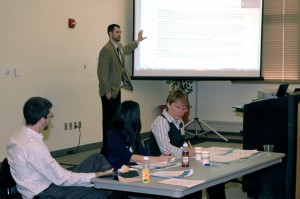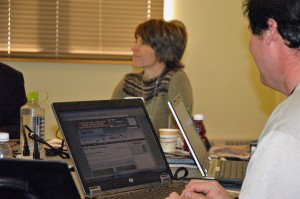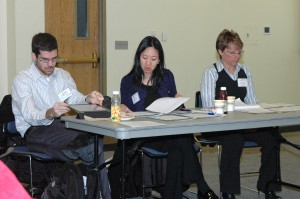Convincing low- and moderate-income students that they can be the first in their families to pursue education after high school is a challenge bigger than any one college or university.
 That’s why Phillip Morris, project coordinator, Southern Colorado Higher Education Consortium, invited faculty from ten two- and four-year colleges to UCCS last week to talk about new ways of reaching students who may not think college is possible.
That’s why Phillip Morris, project coordinator, Southern Colorado Higher Education Consortium, invited faculty from ten two- and four-year colleges to UCCS last week to talk about new ways of reaching students who may not think college is possible.
“Every college offers courses,” Morris said. “But our challenge is to put courses together that are accessible, interesting and engaging for a first-generation or minority student who has done well in high school but might not be at the top of the class. That takes a different approach.”
On Jan. 12 and 13, the faculty brainstormed new ways of reaching still-in-high school teens. The discussions ranged from pedagogy to pledges that courses will have appropriate academic standards and will transfer to any of the consortium-member schools. Joining the discussion via Cisco Telepresence was Nancy Hoffman, vice president of Boston-based Jobs for the Future, and representatives from Harrison High School in Colorado Springs. Each provided insight into what approaches work best for high school students as faculty from the consortium-member colleges and universities shared ideas.
 Borrowing from national data, personal experiences and successful programs such as the UCCS Freshman Seminar, the participants offered suggestions for courses that included using elements of video game design, online course delivery and courses with strong practical applications. By fall 2012, the group hopes to offer ten new college-level courses to students still in high school, a feature common in metropolitan-area schools but often rare in rural districts that dominate southern Colorado.
Borrowing from national data, personal experiences and successful programs such as the UCCS Freshman Seminar, the participants offered suggestions for courses that included using elements of video game design, online course delivery and courses with strong practical applications. By fall 2012, the group hopes to offer ten new college-level courses to students still in high school, a feature common in metropolitan-area schools but often rare in rural districts that dominate southern Colorado.
“Statistically, we know that the more college credit that is earned in high school, the more likely a student is to go on to college,” Morris said. “Practically, we’re trying to show students that they can ‘cut it’ at the next level.”
Ideas for college-level courses delivered to high school students included a “Math in the Real World” course that combined personal finance lessons with practical advice about paying for college, a study skills course, a Western civilization course where students assume a role in time and earn points for posting comments in an online discussion and a Colorado ecology course where students visit a variety of eco zones.
 Morris believes fellow educators sharing ideas will develop stronger courses. Additionally, by offering students a selection of ten courses guaranteed to transfer to any one of the institutions, students will find something that sparks a desire to continue their education past high school.
Morris believes fellow educators sharing ideas will develop stronger courses. Additionally, by offering students a selection of ten courses guaranteed to transfer to any one of the institutions, students will find something that sparks a desire to continue their education past high school.
“The goal is to increase access to higher education,” Morris said. “It’s not just about boosting enrollment at UCCS. We believe, as a philosophy, that our region will be stronger if a student pursues education after high school.”
The UCCS participants in the discussion were
- Pam Shockley-Zalabak, chancellor
- Julaine Field, associate dean, College of Education
- Monica Yoo, assistant professor, College of Education
- Peg Bacon, provost
- Kee Warner, associate vice chancellor for diversity and inclusiveness, Academic Affairs
- Carley Ries, director, Campus Wide Extended Studies
- Barbara Gaddis, executive director, Student Retention and First Year Experience
Other participants included representatives of the CU Office of the President, Western State College, Trinidad State Junior College, Pueblo Community College, Fort Lewis College, Colorado State University-Pueblo, and Adams State College.
For more information about the SCHEC, visit https://communique.uccs.edu/?p=2259.
Photos by Tom Hutton

Leave a Reply